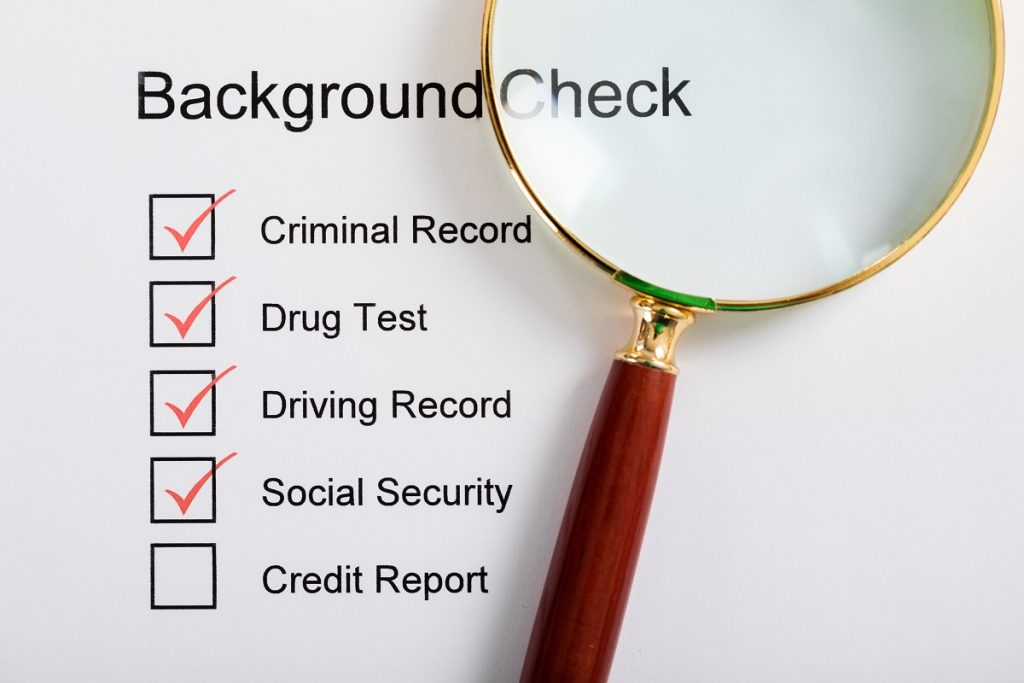Many employers do background checks on prospective employees that reveal not only criminal records but also negative credit history, driving record, failed drug tests, social media activity, and lots more. The process protects employers but may bias them against someone based on information irrelevant to the job.
If you are searching for a new job, you should know that employers have every right to do a background check on you. Of course, you may be hoping for a second chance if you have a criminal history and have served your time or have certain other issues on your record, but having that on record can make getting certain types of jobs more difficult.
Employers can look at more than your criminal history. In some cases, credit problems, job history, evictions, driving history, drug problems, and other factors can negatively impact your chances of getting a job.
Table of Contents
Why Do Employers Often Do Background Checks?
Many employers perform background screenings on job applicants to give them a more complete picture of who they might be hiring; 95% of employees are subject to this scrutiny. Employers can run a concise check to ensure that the candidate’s social security number is real, or they can run more thorough ones.

Background reports can detail many different things depending on what the potential employer is looking to learn about candidates. Federal laws protect job candidates by regulating what employers can look for, and background checks must follow the Fair Credit Reporting Act (FCRA) to ensure that the law is followed. Most states also have rules to follow about background checks.
For one thing, employers must let applicants know they are subject to a pre-employment background screening. In most cases, arrests not resulting in convictions, liens, collections, civil judgments, or bankruptcies at least seven years old are omitted.
Why Do Some Potential Employees Not Want Them?
Job seekers might want to avoid having a background check run, especially if they have a criminal record. When they filled out the employment application, they might not have listed a conviction in hopes the employer might not learn of it. When this information comes back on a background check, the applicant may be penalized for not putting the correct information on the application as well the criminal behavior.

However, did you know that background checks can show much more than criminal convictions?
If people have had problems with credit in their history, that can show up in a background check. A credit issue will just show one piece of the puzzle. What is missing are the extenuating circumstances that can contribute to the financial problem. Yet, insurance companies and banks looking to hire someone to handle money may not want to take the risk.
People sometimes inflate their background, degrees, or experience. Background checks often verify employment history and can uncover gaps. This may be a red flag to employers that applicants are misrepresenting their credentials.
Misdemeanors usually have no bearing on a person’s ability to do a job well. But some of them may taken into consideration for employment.Traffic violations can be important if you are applying to be a bus or truck driver, for example, but if the job has nothing to do with driving, they may not be relevant.
Applicants may be able to counter damaging information in a background check with honesty during the interviewing process.
What Is Included In A Background Check?
There are many things a prospective employer might look at when doing an employment background check.
- Court Records can include anything from family court to bankruptcy to criminal issues.
- Credit Checks involve showing if someone has had financial issues.
- Criminal History may be relevant for certain jobs. For example, someone on the sex offender registry may not be a good candidate to work in a school. But sometimes criminal history is simply held against a person, even many years after the event.
- Driving Records are important for employment related to driving. such as truck or bus drivers or perhaps even for someone who makes sales calls using a corporate vehicle.
- Drug Screening is required for many types of jobs.
- Employment History can raise flags if the person has gaps in their history or lies about their past experiences.
- Past Compensation is something employers may want to know prior to making a job offer to someone.
- Social Media History is something many employers look at now. If you have questionable activity on your social media, keep in mind that some employers might hesitate to hire you.
- Social Security Verification will ensure the person has provided accurate information.

What Are The Pros And Cons Of Background Checks?
When contemplating the positives and negatives of doing background checks on applicants, it depends on your perspective. From the applicant’s perspective, some background checks are intrusive. Especially if a person want to make a new start, old history can get in the way.
Employers gain useful information about candidates. However, that information may be skewed because it is not within a greater context. For example, you might see that someone filed bankruptcy. What you might not see is that the bankruptcy happened during a messy divorce or after having a child pass away. Context matters, and you could end up missing out on a great employee due to jumping to conclusions.
A positive aspect of running background checks is that you have some insight into people you want to hire. You can see glimpses into their personal life that you might not otherwise see.
The FCRA may protect jobseekers from some abuses, but a background chcxk may turn up hurtful information that may not have anything to do with the job.
Can You Say No To A Background Check?
If a background check is part of a business’s hiring process, be prepared to lose out on the opportunity if you refuse. In other words, you have every right to say no. However, the company has every right not to move forward with you as an applicant if you refuse.
Sometimes an employee is engaged in a job search, and they know that a previous employer will not give them a favorable review. Whatever you do, you should not lie on an application or in an interview. Rather, just admit that you and your supervisor either did not get along or parted ways negatively.
How Do You Get A Job Without A Background Check?
Some jobs are less likely to require a background check. Many of these are entry-level jobs or places where they are probably not going to worry about the histories of people of people they hire. These could include:
- Farm Work: Farms often need many employees for milking, tending crops, picking vegetables, etc. They typically do not require background checks.
- Housekeeping: When looking for employment that won’t require a check, another option is housekeeping-type positions.
- Landscaping: This can be backbreaking labor that many people don’t want to do. This can work to your advantage if you are looking for a felon-friendly job.
- Restaurants: Restaurant staff who work in the back end, mostly kitchen work, can be a gig you may be able to get without undergoing a background check.
As remote work becomes more popular, some work-from-home jobs may not require background checks. Job listings often indicate what the employer requires in this regard.
What Kinds Of Jobs Don’t Require Background Checks?
Jobs that don’t have you working directly with people may not require a background check. Those who work with vulnerable populations, such as children or the elderly, are background check jobs. In other words, hiring managers are going to dig into your history.
State regulations vary, so applicants barred from getting certain kinds of jobs in one state may find that criminal history or other information will not hurt them elsewhere.
People are often surprised to hear that many fast food places, such as McDonald’s, do check into their employees prior to hiring. Amazon is another big company that digs into the past of everyone they hire.


